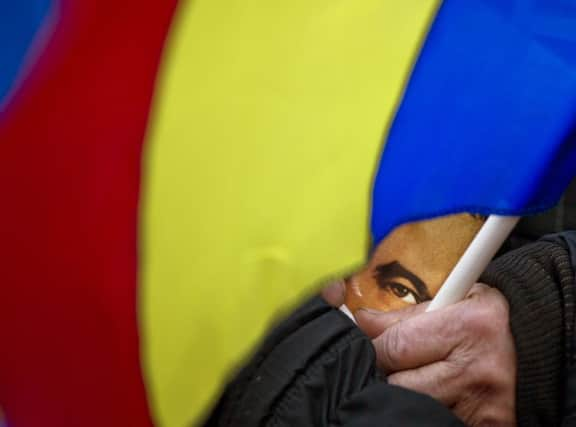Jane Bradley: My Christmas wish for Romania


First of all, I need you to think back to what you were doing this time 25 years ago. That’s right, Christmas 1989.
I can tell you what I was doing. I was nine years old. I’d just got a chemistry set for Christmas. I was probably eating my several hundredth turkey sandwich of the week and badgering my parents to play Trivial Pursuit.
Advertisement
Hide AdAdvertisement
Hide AdIt was, to tell you the truth, remarkably similar to how I spent Christmas this year. My daughter isn’t quite old enough for a chemistry set, but we’ve played endless games of snap and enjoyed taking the pink and white plastic dog she requested from Santa for walks around the block. I’ve eaten a lot of turkey sandwiches. To be honest, the main difference is that the decor is slightly less brown than it was in the 1980s and we had smoked salmon instead of prawn cocktail for our Christmas dinner starter.
In a certain other country close to my heart, however, Christmas was unrecognisable in 1989. For 25 years and two days ago, news of the execution of one of Europe’s most infamous dictators was broadcast on television stations all around the world.
Here in Britain, people woke on Boxing Day and picked up their newspaper to discover that the Romanian leader Nicolae Ceausescu had been shot by a firing squad on Christmas Day after two weeks of bloody revolution.
The occasion has, for most people here, passed into history. When eastern European history is mentioned, it is quickly swept aside: “Ceausescu was killed. Communism ended. And they all lived happily ever after.” In reality, it didn’t quite work like that.
For my friend Monica’s family, Ceausescu’s demise came two days into their mourning of the death of her cousin’s daughter – nine-year-old Laura Negrutiu – who was killed by a stray revolution bullet which whizzed into her Timisoara home as she lay on the living room sofa with her grandmother, watching the dramatic events unfold on TV. If Laura had lived, she would have been exactly the same age as me now. She too, could be enjoying a peaceful Christmas – perhaps with her own daughter or son. Monica’s family has never got over what happened to Laura. A tragic, million-to-one death. While Laura’s family’s lives were changed forever on that day, so, in other ways, were the lives of all Romanians.
Since Christmas 1989, the country has gone through an enormous shift, economically and politically – some of it good, some bad.
Pictures published in the Romanian media this week to mark the anniversary of the revolution show Cluj, my one-time hometown, as a battlezone. People shot in the street outside my local market. Tanks and soldiers in front of the cafe where, just a decade later, I used to have my Sunday morning cappuccino.
This week, the country’s new president, Klaus Iohannis, pledged to tackle corruption and take Romania in a new direction. There is a real feeling that Mr Iohannis’s appointment will finally see a major sea change in the country.
Advertisement
Hide AdAdvertisement
Hide AdOn a consumer level, the past decade has transformed towns and cities – with brands like H&M, Monsoon and Debenhams moving in. Entrepreneurialism is booming.
But while there has not been a Communist party in Romania since the fall of Ceausescu, there has long been a lingering feeling that it is hard to shake off the old guard and that old habits die hard.
It has also come under enormous criticism from the anti-immigration lobby who criticise Romania’s continuing corruption levels, complain that the country isn’t, in some ways, as modern as others in the European Union – that it sometimes needs some help from its European neighbours. Is that really a surprise?
People expect so much of Romania – and the other countries which endured decades of Communist rule. They expect that almost overnight, they should become as western as the countries like ours.
For most of us here, life 25 years ago was normal – almost indistinguishable from that of today. There, it was not. Have a think about that while you’re eating your mince pies.